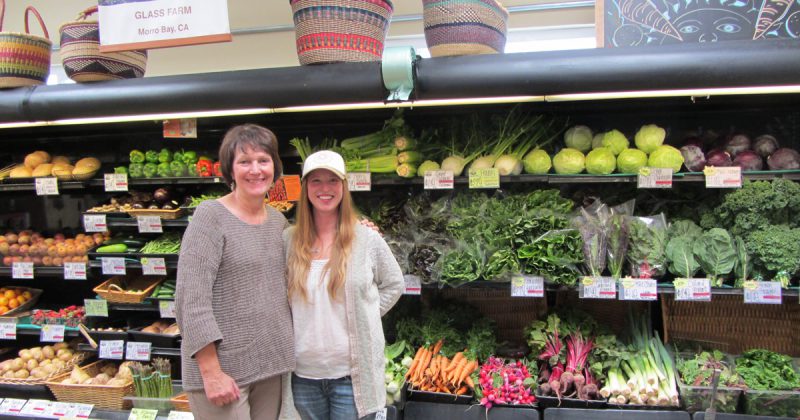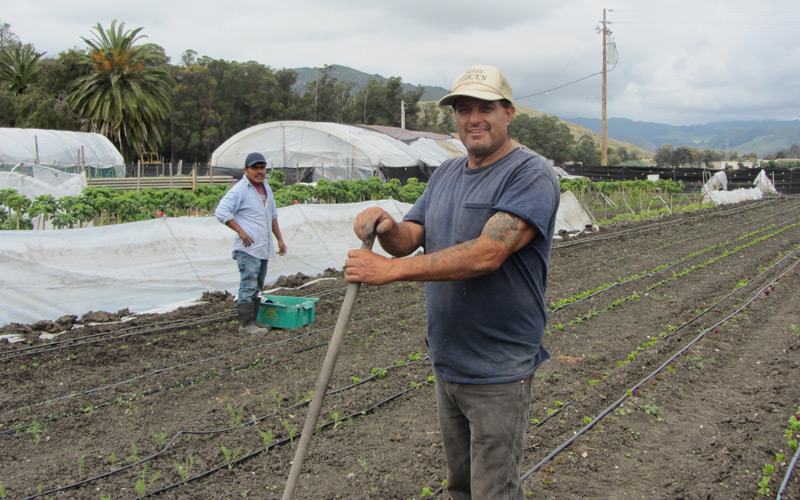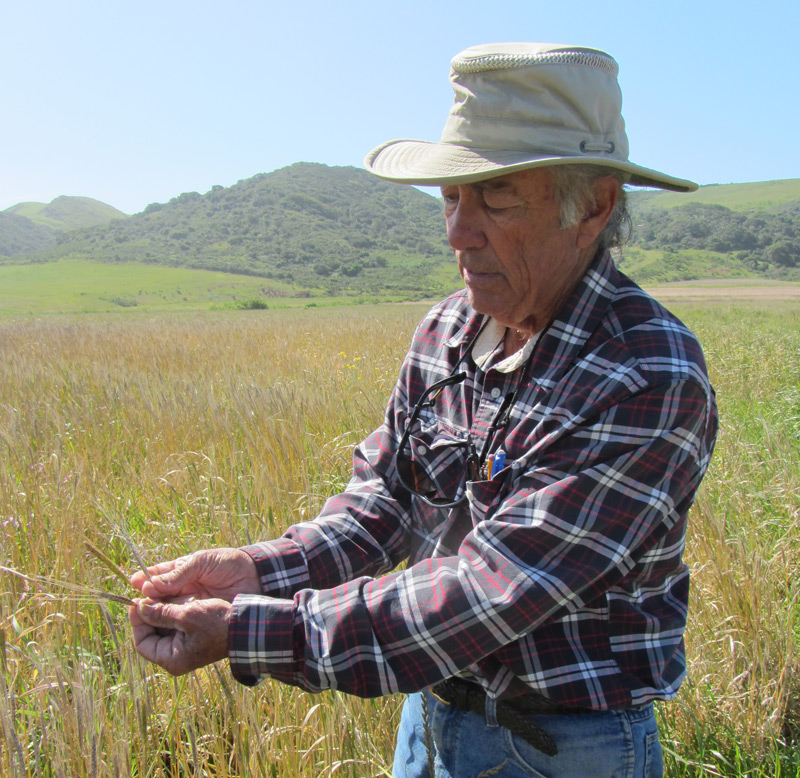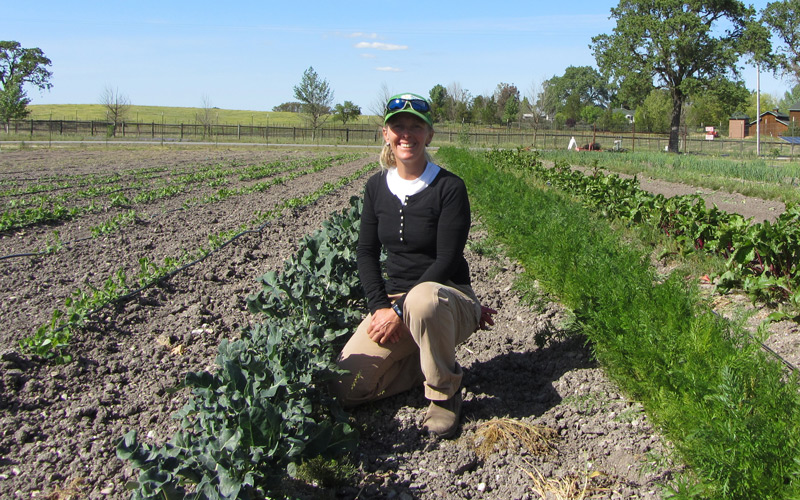
SLO Natural Foods Co-op general manager Gwen Schmidt and produce manager/buyer Tifney Melton show off the fresh, local vegetables offered in the store.
After more than 30 years in business, the SLO Natural Foods Co-op in San Luis Obispo, California, probably would not have continued to survive without the help of Slow Money SLO. Inspired by a desire to save the community’s beloved store, a group of investors started Slow Money SLO and in 2013 made $87,000 in peer-to-peer loans to help the co-op move from a tiny, rustic space to a much larger building nearby. Some of the lenders also assisted with the tenant improvements and even joined the board!
With the help of Jeff Wade—Slow Money SLO founder and executive director—that move is proving to be beneficial not just for co-op members/owners and other customers, but also for many local food and farm businesses, the health of the soil, the local food system, and the local economy. Farm and food products from 85 local suppliers now grace the co-op shelves, quadruple the number before the move, and co-op member-ship has grown from 450 to 1,150 over the past 4 years.
“It’s a win-win for everybody!” says the co-op’s general manager, Gwen Schmidt. The mission of the member-owned store includes providing the community with “real food,” and buying from local farmers and suppliers. With 30% of the store’s fresh produce now coming from local family farms, SLO Natural Foods has a competitive edge over nearby healthy food chain stores.
“We love working with our local farmers,” Schmidt says. “Their products are beautiful, they’re so colorful and fresh, and we can get more variety—sometimes including things we’ve never heard of!”
In the welcoming produce department at SLO Natural Foods, large photo banners of local family farmers hang from the ceiling. On the beautifully arranged rows of amazingly fresh organically and sustainably grown vegetables and fruits, shoppers see an abundance of brightly hued “local” stickers on the labels, alongside the name of the farm where the crops grew. A blackboard proclaims: “We (heart) farmers.” Produce buyer/manager Tifney Melton says, “It’s so nice to call the local farmers and get their produce delivered the next day. Some farmers will deliver every day, some a few times a week, so everything is always gorgeous and fresh.” In the months since Tifney started buying more produce from local farmers rather than from an out-of-town distributor, fruit and vegetable sales at the co-op have doubled. Local family farmers—and the healthy soil where they grow their crops—also are reaping the benefits.
Across town in the fields farmed by one of the co-op’s local suppliers— Javier Magaña of Red Barn Farms—a wide variety of vegetable crops flourishes in the springtime warmth of a recent morning. Javier and his helper Domingo spread composted chicken manure from his abundant flock on the soil between rows of young lettuce plants. They’ve just picked cases of fresh spring vegetables for delivery to SLO Natural Foods Co-op: golden beets, English peas, red chard, green garlic, Russian kale. “With the extra money I get from the co-op, I can pay for a worker,” Javier says. He also was able to lease more farmland from the City of San Luis Obispo, which owns the SLO City Farm where Javier’s vegetable crops grow. It’s prime agricultural soil that developers were required to provide to the city in exchange for permission to build a shopping center. Javier’s sustainably grown vegetables from the SLO City Farm also are sought by farmers’ market customers, local gourmet restaurants, a local farm-fresh produce box delivery service called SLO Veg, and Javier’s wife’s cold-pressed juice and vegan café business, Julia’s Juices.

Down the road at 195-acre Kandarian Organic Farms in Los Osos, enthusiastic farmer Larry Kandarian grows more than 200 varieties of ancient grains, beans, peas, seeds, and herbs, alongside native plants produced for revegetation projects around the state. The SLO Natural Foods Co-op was his first customer, buying a variety of certified-organic dried beans, grains, seeds, and herbs after the move to a bigger store. “The co-op helped me expand my retail sales,” Kandarian says. “Now we’re getting so popular! I used to say, ‘Where will we sell all this?’ Now I say, ‘Where will we grow all this?’ ” Kandarian Organic Farms’ ancient grains—including Ethiopian blue tinge farro, Peruvian purple corn, and einkorn—have earned a cult following among sourdough bread bakers around the world, Larry attests. He’s also excited that his emmer farro was featured in a delicious Mediterranean salad dish recently served in the local middle school’s cafeteria. “We trained four school chefs,” he says. “It’s the first time in the nation that emmer farro has been served in a school cafeteria!”

Another farm that supplies the SLO Co-op—Templeton Valley Farms—has increased its vegetable production thanks to its sales to the co-op. On five acres, farming couple Trina Baumsteiger and Edwin Rambuski grow various certified-organic vegetables, berries, fruits, and flowers, and have a flock of 70 chickens. The farm uses its own compost and high-quality organic fertilizer. The 30 or 40 families who come to the farm to pick up their weekly CSA farm boxes are treated to about 15 different food items. On a sunny spring afternoon, as customers arrive for their boxes, Trina makes colorful flower bouquets and Edwin runs the tractor to mound soil around rows of young potato plants. “I have a lot of vegetables, and I really want to share! I just call Tifney at the co-op, tell her what I have, and make deliveries once or twice a week. We work really well together,” Trina says.

Quite a few other local food businesses—including Mama Ganache Artisan Chocolates and Vert Foods catering and meal preparation—buy many of their ingredients at SLO Natural Foods Co-op, in some cases making products that are then sold at the co-op. Virginia Marum of Vert Foods, for example, says that she supports her belief in sustainable economics by purchasing local foods to provide nutrient-dense meals for local families.
SLO Natural Foods and Slow Money SLO continue to be great partners in promoting local food, and have collaborated with Niner Wine Estates in Paso Robles, California, to promote the importance of local food consumption. Niner Wine Estates has twice invited SLO Natural Foods Co-op and Slow Money SLO to participate in its popular farm-to-table dinners. Niner avidly supports local farms, and even has its own on-site garden. Food and Wine magazine named Niner as one of the Best Winery Restaurants in America for 2017. “Slow Money SLO is a super-important link in the local food chain,” says Andy Niner.
The success of the co-op and the expansion that the Slow Money SLO loan enabled are creating positive repercussions throughout the community—an impact that Larry Kandarian calls “dendritic.” The loans were fully paid back more than a year ago, and today the local co-op has enough sales volume and revenue to qualify for membership in the National Co-op Grocers, a “co-op of co-ops” that offers the buying power of 200 stores. The resulting reduced prices are helping the San Luis Obispo store compete against bigger chains.
As the co-op’s produce manager Tifney says,
“Our family farmers and food producers work so hard for us to eat this well, it’s important to support them.





